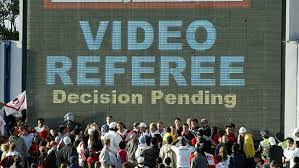By Andrew Warshaw at Soccerex in Manchester
September 8 – Video technology, arguably the biggest ever law change to football, must be given the green light sooner rather than later to pull the game into the modern age, according to Dutch pioneers of the idea.
Gijs de Jong, director of operations at the Dutch FA who have been unofficially experimenting with the system, said the game’s ultra-conservative lawmakers had to get to grips with the ever-increasing demands on referees and not let the concept of technology fester on the backburner indefinitely.
Delegates at the Soccerex forum in Manchester were shown a detailed presentation today of how easily the system works, with a rugby-style video assistant watching from the sidelines and ruling within a matter of seconds on contentious decisions such as red cards, penalties and crucial offsides.
The Dutch want to be given permission to test video technology in live games, something the International FA Board, the game’s custodians, were reluctant to endorse earlier this year even though the English and Scottish federations were in favour.
While many fans support football adopting a practise used for years in other sports, FIFA take the view it is far too radical to approve anything other than goal-line technology which itself took decades to come into force, and that video technology would stop the flow of the game.
But de Jong countered football must not get left behind. “There are a lot of concerns about video technology but it’s crazy that in 2015 we are talking about whether or not to use it,” he said. “How do you explain to your children why we don’t use it? It’s so logical. It’s not a revolution. It’s just commonsense.”
UEFA president Michel Platini, the front-runner for the FIFA presidency, has made no secret of the fact that he is totally against any form of technology for fear of slowing down the game.
The Frenchman has only recently embraced goalline technology, and even that reluctantly.
But under the Dutch experimentation, contentious decisions take a maximum 15 seconds to be resolved and de Jong argued: “You hear people saying this will cause a delay. But you already have delays when the referee talks to his assistants. When you see the examples we have, you can see very clearly that within seconds you can help referees just by giving them factual information. We don’t want to bring in another subjective opinion.”
“IFAB has not said never, they just want further information, and they now have a technical advisory panel with former players. Everyone from this panel has reacted positively and it’s a pity we haven’t yet been given permission because we have the support in the Netherlands of players, coaches, clubs and the general public. I can understand IFAB’s caution because any decision they take will affect the whole world but why not let us at least test it now and see in maybe two years what the result is.
“It’s difficult to convince FIFA but it’s clear IFAB are thinking about it. Three years ago, they said only goalline technology. Now you can see things shifting a bit. Obviously there’s a FIFA presidential election coming up but if they decide at, say, the beginning of 2016, we could start testing in 2016-17 and maybe have a final decision (for implementation) in 2018.”
England’s Howard Webb, one of the world’s best-known and most respected referees who is now retired and works as a consultant and tv pundit, says officials would support seeing how video technology works in practise.
“We are keen to look at anything that makes our job easier and more credible on the field of play so that we can make fewer mistakes,” said Webb, another of the panellists.
“Some people might feel they don’t want it because it will change the way the game is played and not what we have done in the past. We’ll never reach 100 percent accuracy and the referee would still be the main man. But I’d like to see this live trialled. Otherwise you’ll never be able to move the argument forward whenever there is a contentious decision in a major tournament.
“It would rule out those clear, obvious mistakes that affect the outcome not only of matches but also the career of a referee, mistakes that can impact on colleagues of mine that mean they don’t go to World Cups or have their careers tainted by one big decision.”
Contact the writer of this story at moc.l1744971658labto1744971658ofdlr1744971658owedi1744971658sni@w1744971658ahsra1744971658w.wer1744971658dna1744971658

